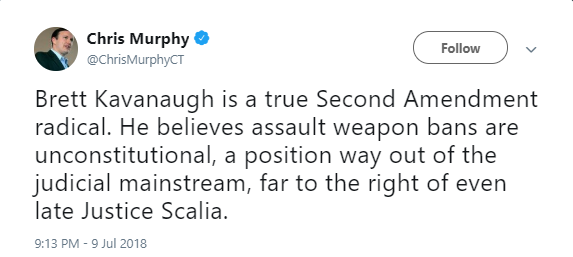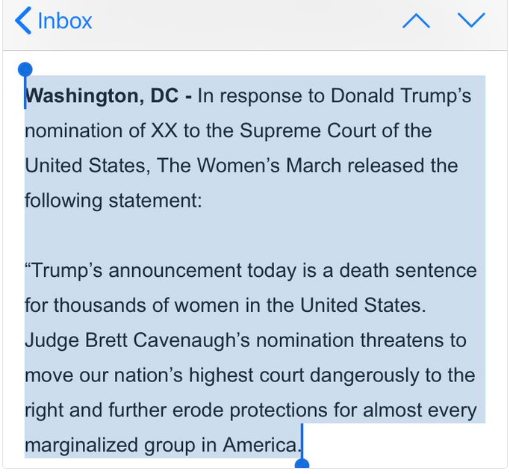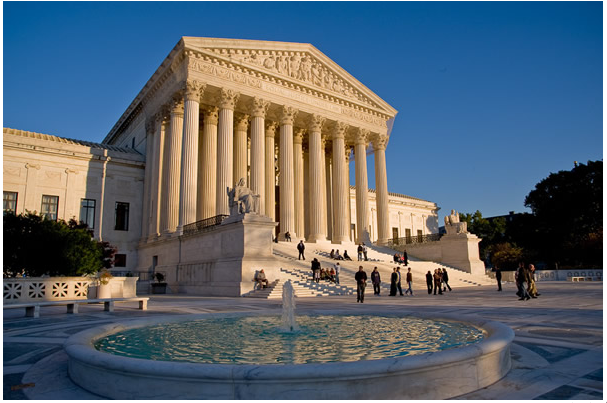Last night President Trump announced Brett Kavanaugh as his pick to replace retiring Supreme Court Justice Anthony Kennedy. So what do I think about Kavanaugh?
Meh.
It is an underwhelming choice
He’s no Merrick Garland, which is good. But he’s no Neil Gorsuch, which is bad. I would have preferred Judge Don Willett from the 5th Circuit or Judge Kethelridge of the 6th. Someone who be a strong advocate of personal rights and stop the erosion of the rights guaranteed in Bill of Rights (including the unenumerated ones in the 9th). Kavanaugh is not that and is very much a justice in the John Roberts mold. Read his dissent in Seven-Sky v. Holder, 661 F.3d 1 (D.C. Cir 2011) and you see how simpatico he is with Robert’s decision in National Federation of Independent Business v. Sebelius, 567 US 519 (2012).
In Seven-Sky, Kavanugh saw the mandate in Obamacare as a tax (despite everyone involved in the bill’s passage clearly stating it was not) and arguing the Court could not even consider the case until the law went into effect (post-2012 election) citing the Anti-Injunction Act of 1867. (That holds Courts cannot hear pre-enforcement challenges to the assessment and collection of taxes).
Kavanaugh is certainly not a civil libertarian and will continue upholding the steady erosion of the 4th Amendment thanks to our continued misguided drug war. So,….wait, what? Sen Chris Murphy wants to chime in? Ok

Well, I guess, Kavanaugh won’t be that bad.
Murphy really does want to be known as the Stupidest Man in Government. There is nothing to suggest Kavanaugh is going to be striking down laws the prevent citizens from owning Surface to Air Missiles or Machine Guns. He might not even allow this assault weapon:

(UPDATE 1: David Kopel of the Volokh Conspiracy outlines Kavanaugh’s actual views on the 2nd Amendment post Heller)
On the plus side, he seems to be wary of excess regulations and may be willing to strike down the horrible, pro-bureaucrat Chevron Deference.
(UPDATE 2: Ken White, a/k/a Popehat has posted a piece suggesting Kavanaugh is a strong proponent of a robust First Amendment).
Also interestingly, since the left is swooning over an absurd, irrational fear that with Kavanaugh, SCOTUS will overturn Roe v. Wade, is the Judge’s opinion in Emily’s List v. Federal Election’s Commission, 581 F.3d 1 (D.C. Cir 2009). In that case, Emily’s List, a pro-abortion Special Interest Group, challenged the Federal Election Commission’s rules making it harder for advocacy groups to raise money for election campaigns. The decision, which came a year before Citizen’s United, struck down the FEC rules. If, as some on the left are hyperventilating, Kavanaugh is ready to strike down Roe and institute the Handmaiden’s Tale, it seems odd he would be loosening the rules to allow a pro-abortion group to raise more money.
And that is going to be the problem for the Democrats in opposing his nomination. (Well that and Chuck Schumer’s decision to die on the hill of the Gorsuch nomination- Thanks to Schumer, Trump only needs a simple majority to confirm Kavanaugh. Had the Senate minority leader kept his powder dry, the filibuster would still be in play and would have given him more leverage, especially in an election year.) While Kavanaugh has some issues, none of them appear so damaging they will preclude his confirmation. Indeed, the Democrats and their allies already made clear they were going to oppose anyone nominated on the grounds of him/her being dangerous etc:

One line of attack has been: Kavanaugh believes a President is above the law.
The “support” for this is a law review article. In the article, Kavanaugh sets forth some changes he believes should be made in the way the government operates. Regarding the President is above the law claim, it’s basis is found in his argument a President should be temporarily immune to lawsuits (and possibly criminal prosecution) during his term of office.
With that in mind, it would be appropriate for Congress to enact a statute providing that any personal civil suits against presidents, like certain members of the military, be deferred while the President is in office. (1460-1461)
Yes, that dastardly Kavanaugh is saying… Congress should pass…a law…. to give temporary immunity….?
This is the proof he believes Presidents are above the law?
Here’s a pro-tip. If Kavanaugh really believed Presidents are above the law and immune during their tenure, he wouldn’t be calling for Congress to pass a law making it so. It is quite clear he believes the current status is the exact opposite.
It should be noted the law review article was published in 2012 and based on a speech he gave October 2008 and is based on his experience in the Bush (43) White House and as a member of Ken Starr’s Special Prosecution Team during the Clinton Presidency. That’s right, Kavanaugh’s argument is based upon his time investigating a sitting president. So I seriously doubt he had Trump in mind. And the fact he is advocating something that would have prevented him from investigating a Democrat suggests maybe he didn’t have some sort of partisan motive in making this suggestion.
(And for the record, I think some of what Kavanaugh proposes has some merit. His arguments about a 180 day cap before an up or down vote on nominees has some appeal and is being taken up by others. The most recent suggestion is a law that would take effect Jan 20, 2025. That way no one would know who it would favor. I’m not as impressed with the concept of a single 6 year Presidential term. While the Founders did consider it, they ultimately decided against it.)
This is something I plan to expand on in the coming weeks, but the so-called #Resistance has really got to get some anti-psychotic meds because they have lost it. I mean, I’m old enough to remember when claiming Sharia Law was about to imposed upon the United States was a sign of mental instability (see e.g., here and here). Now, it’s taken as a fact for what Trump is trying to do:

Democrats are doing themselves no favors by hunkering down with the Alex Jones’s of the left. And the increasingly overt anti-Catholic arguments against his nomination reveal the Left’s tolerance only extends to those who don’t disagree with them.
Nor will they impress anyone with their seriousness by ignoring Kavanaugh as some are apparently doing. (I wonder if Harris will be running around with a towel over her head).
Barring a Black Swan event, Kavanaugh will get confirmed.
And that will not cause the Earth to crash into the Sun.


